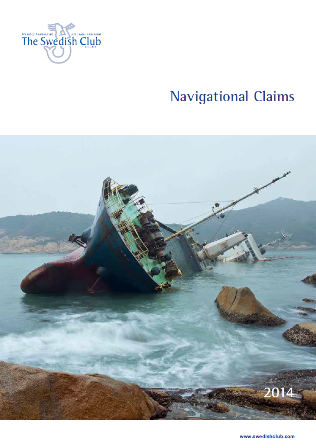In a report just published by the mutual hull insurer and P&I club The Swedish Club, lack of MRM has been identified as a common contributing factor in navigational accidents. The report is based on hull and machinery claims between 2004 and 2013 and the navigational claims – collisions, contacts and groundings – have been analyzed in more detail. The report lists a number of contributing factors behind these claims. The most important being:
- Non-adherence to procedures
- Ineffective communication
- Poor lookout
- Lack of situation awareness
- Complacency
The report confirms the picture that we have seen for a long time – accidents are caused by “non-technical” factors rather than lack of technical skills. The non-technical factors are the focus area of Maritime Resource Management (MRM) training and the report also concludes that shipping companies need to better implement MRM in their organizations for substantial improvements to be seen.
Click here or the picture below for the report (1.5 MB, pdf-format).


Dear Madam, Dear Sirs;
From: Capt Michael Neuhaus; Director Aethon Marine Services Dubai, UAE
With reference to MRM; please note that we are many years in the Marine Vetting and Warranty Industry; I have supported a few training institutes and supported them to developed practical seminars and workshops where we tried to share experience and expertise and generate a discussion since we experienced rising accidents.
My view is that everything has become more sophisticated; talking about ECDIS, mooring rope components and their material characteristics, safety management etc…etc…
The StcW requirements for training are to my opinion sufficient providing they were followed proper; however; there are many courses i.e. IMO model course 1.27 which to my opinion give not sufficient background in order to provide more confidence for the user. Type specific courses for ECDIS are far away from real understanding of the operation if we talk about fundamental understanding; fluent operation and troubleshooting (at least the basic stuff). This is not rocket science; but we need to be far more diligent. The industry cannot dump all the problems on the crews, officers, operators and other organisations; we have to accept that the development of the entire marine industry is purely economically driven and the factor experience, training, team work, support between on / offshore interface, commitment and other values is decreasing. The key factor human is and will always be the one who decides in emergency; and a professional confident leader ship on board and on shore has become more seldom. The future leadership which are now Junior Officers and Engineers will have lots of more problems than we think. The next generation is the one who will lead the vessels and shore management….but where is the experience; and with all respect I do not see in many cases a real confident; knowledgeable attitude; leading ship is not only based on technical sound knowledge, especially in these days it requires psychological skills to evaluate and lead officers and crews and deal with shore authorities and built up a proper teamwork. I was and am involved in many inspections and operations over a period of more than 30 years and I feel that we rather like to promote regulations than to teach them proper; unfortunately for many institutions and operator the certificate is more important than the real background. Professionalism safes not only live but also money.
Capt Michael Neuhaus Aethon Marine Services
I do agree with you.I am a retired pilot.Passion & commitment is need of the hour.Vast gap between seafarers,company,pilots,v.t.s.,ports has to come out with a practical connection to save the lives, properties at sea.
Only administrative legislation won’t help.